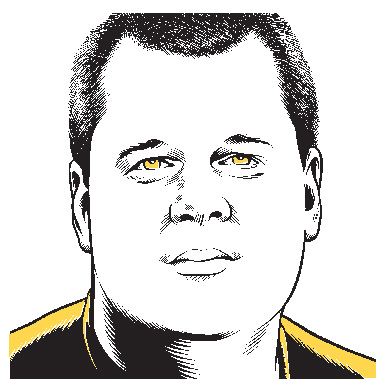- LAUREATE: Paul Heyse (Germany, 1910)
- BOOK READ: In Paradise, translator unknown
Paul Heyse, the winner of the 1910 Nobel Prize in Literature, lived from 1830 to 1914, but I swear I knew the guy right after college. It seems a hundred years ago now. My girlfriend and I lived in a tiny apartment, listening to a lot of bands from New Zealand. I was trying to write a novel and she was trying to draw. When night fell we’d walk a couple of blocks to a colorful bar and sit in a booth with our artsy comrades, and I swear Paul Heyse was there, engaged in catty gossip and bold artistic proclamations until the two were indistinguishable.
When I look back on that time it seems like pure freedom and happiness. And yet, of course, I was worried all the time. I didn’t like being a struggling writer, trying to wrestle with the world in bad bars with my loser friends. The only way I got through it was by telling myself that this restless and scrappy time would seem glamorous and bohemian in retrospect, that the personal dramas and professional crises would become the quaint anecdotes of a person whose life had actually begun. As it turns out, I was right.
So was my pal Paul Heyse. His two-volume novel In Paradise, one of the books cited by the Prize Committee, basically takes place in that bar—although admittedly the bar is in 1869 Munich—and a few cheap rented rooms nearby. There’s a sculptor. There’s a painter. There’s another painter. There’s a musician who also does some painting. And there’s an artist’s model, and guess who has a crush on her.
This is an old setup, and Heyse doesn’t exactly make it new. But he does make it good. Each character has some baggage that gets passed around—a youthful mistake, a failed love affair, a sinister secret—and there’s a snappy pace to the proceedings. But in counterbalance to the flushed embraces and the tearful confessions, Heyse zeroes in on the restless unhappiness of rarified youth, the ennui that accompanies a class of people with no responsibilities whatsoever, who may laugh and shout all day in a beer hall but get a little lonely when they go home:
He had now attained what he cared for more than anything else. No one could enjoy more perfect freedom than he. No one could begin life afresh more untrammeled by social forms… And when, notwithstanding all this, he went to bed with a heavy sigh and waited long for sleep in vain—why was it?
Like the plot, this sort of thing isn’t exactly original,...
You have reached your article limit
Sign up for a digital subscription and continue reading all new issues, plus our entire archives, for just $1.50/month.
Already a subscriber? Sign in





